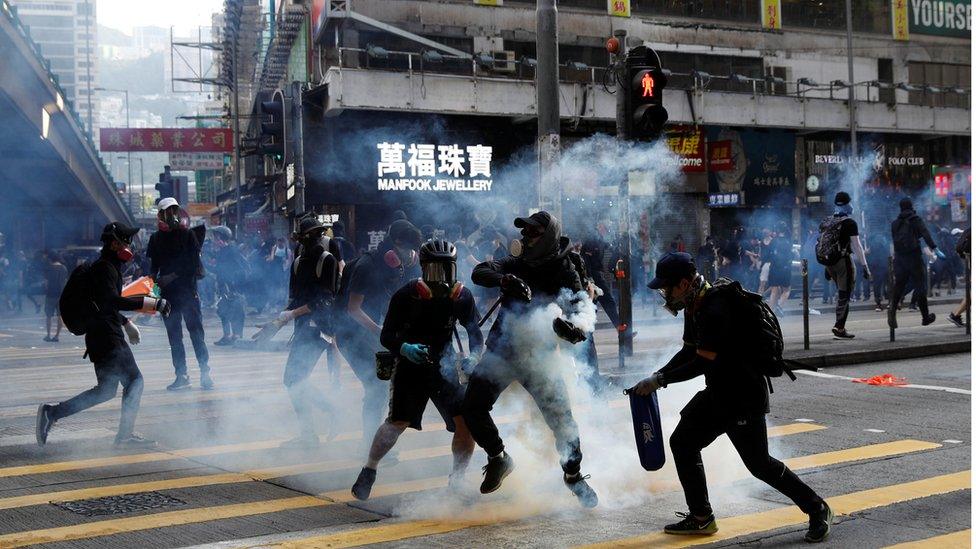Hong Kong Polytechnic University: Protesters still inside as standoff continues
- Published
The history behind Hong Kong's identity crisis and protests - first broadcast November 2019
Up to 200 anti-government protesters remain barricaded inside a Hong Kong university, surrounded by police, as the standoff continues for a third day.
Those who are still inside Polytechnic University (PolyU) are said to be running low on supplies.
Protesters have been inside the campus since last week, initially stopping police from entering by lighting fires and throwing petrol bombs.
Adults who leave face arrest, and some are too scared to come out.
Hundreds of protesters tried to run from the campus on Monday, but many were hit with tear gas and rubber bullets and arrested.
Police have revealed that on Monday alone, at the campus, they used:
1,458 tear gas canisters
1,391 rubber bullets
325 bean bag rounds
265 sponge bullets
A small group of protesters managed to leave using rope ladders before being picked up and driven away by motorcyclists.
Those arrested could be charged with rioting, which carries a penalty of up to 10 years in prison.
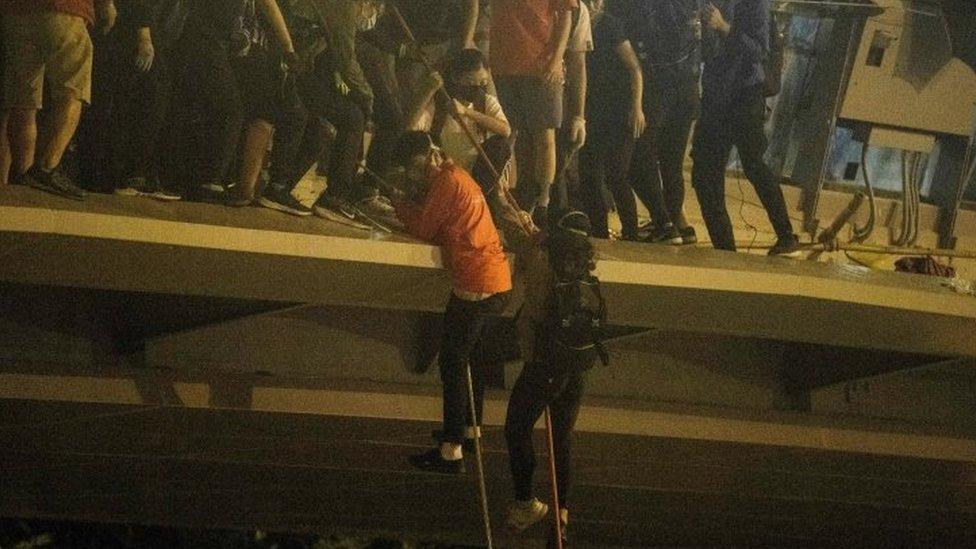
Protesters lower themselves down a rope from a bridge to a highway to escape the Polytechnic University campus
On Sunday night, police warned protesters they had until 22:00 (14:00 GMT) to leave the campus.
Police later moved in, surrounding the campus, leading to protesters throwing petrol bombs and firing stones from catapults.
The violence at PolyU is one of the biggest flare-ups Hong Kong has seen since protests broke out in June.
Tuesday saw the UN human rights office urge the Hong Kong authorities to de-escalate the situation at PolyU and address the humanitarian situation of those inside which it said was "clearly deteriorating".
These protesters attempting to leave PolyU met tear gas volleys
It added that some demonstrators' use of violence, including against the police, "cannot be condoned".
The mostly young protesters have five key demands, including an investigation into police brutality and universal suffrage.
But underpinning it all is the fear Hong Kong's unique identity is threatened by China.
Tensions now could be further inflamed after China condemned a decision by Hong Kong's high court to overturn a ban on facemasks.
What is happening on Tuesday?
An estimated 100 to 200 protesters still remain in PolyU, authorities have said.
One protester called Jeff told the BBC that he was hiding in a building on the campus.
"I have been trapped inside Polytechnic University for two days and food and water is running out," he said.
"Most people tried to get out of this hell-like place, most of them tried to escape but ended in failure, being arrested or wounded or something."
"I didn't expect this incident to get so desperate in here. The campus is so desperate and I am not well prepared. I would call it a disaster."
He said his parents were concerned for his safety and he had told them he would make it out.
One tourist from mainland China is too scared to leave. He told BBC News Chinese that he was curious about what was going on at the university and had arrived on Sunday at the invitation of a friend who studies there.
After a visit to the library and a meal, he learnt that police had cordoned off the whole area.
"I am not a rioter," the tourist, who wishes to stay anonymous said. "I don't want to get caught and I just need to go back to China."
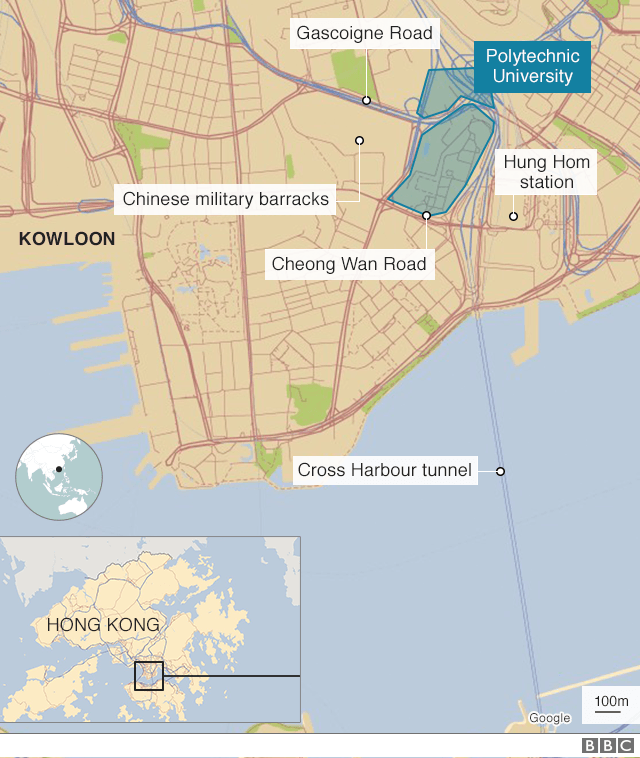
A handful of protesters have been trickling out of the university, some suffering from hypothermia and leg injuries, according to news site SCMP.
One protester said he had decided to come out because of "hunger and cold", adding that many inside were "hurt without enough medical supplies".
Another 16-year-old protester told Reuters new agency she had chosen to "surrender".
"We have been trying to escape since yesterday morning. But then we couldn't find a way out [and] were afraid of being charged," she said. "This is the only way... I was quite desperate."
In the early hours of Tuesday morning, more than 200 students below the age of 18 left, accompanied by education officials including high school principals.
Those under the age of 18 had their identities recorded and were let go. Adults were arrested.
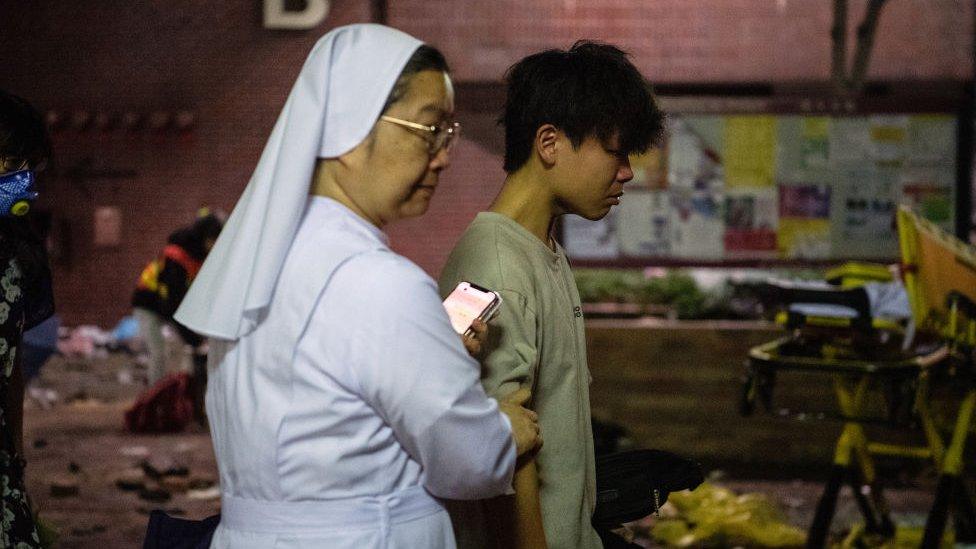
A nun leading a protester out of PolyU
Hong Kong Chief Executive Carrie Lam called on all protesters to surrender, saying no violence would happen if they came "out in a peaceful manner".
However, she said police would have to take "necessary action" if that changed. Separately on Tuesday, Hong Kong's new police chief took office.
Chris Tang said the force was not able to end the protests alone, external, saying the unrest would only end if society condemned the violence.
A number of people have supported protesters behind the scenes, donating supplies to them or picking them up from protests and driving them home to avoid arrest.

Desperate to get out
Pody Lui, BBC News Chinese, at PolyU
We got into the university in the early hours of the morning. Police have cordoned off the area, making it almost impossible for new journalists to get in. Those trapped inside were desperate to get out.
The mood darkened as the day continued. More and more protesters gave up and left the campus willingly to face police arrest. They will be charged with rioting, meaning they could be jailed for up to a decade.
Those determined to stay were getting restless. They were not as friendly to journalists as before. They were scared and couldn't afford trusting a wrong person, fearing anyone could be an undercover police officer.
I overheard a Polytechnic University student talking to her father on the phone. "I don't want to get caught. I will lose everything if I do," she cried. Her tired friend next to her said, "I just want to go home."

What is the facemask controversy?
Hong Kong had previously banned protesters from wearing facemasks - but this was deemed "unconstitutional" by the city's high court on Monday.
China has condemned the high court's decision. It says it has the sole authority to rule on constitutional matters in the region.
Courts in Hong Kong have ruled on constitutional issues in the past. In 2017, the Court of Appeal found the Hong Kong government's decision to deny a partner visa to the wife of a female British expat was unconstitutional, despite the fact Hong Kong does not recognise same-sex marriage.
It is unclear what action, if any, China might take next.
This is a large part of what the ongoing protests in Hong Kong are about. Many in Hong Kong fear that its freedoms - including judicial independence - are slowly being eroded by Beijing.
How did we get here?
Campuses had remained relatively free of violence during the Hong Kong protests - despite the movement being led mainly by students and young people.
But after the death of a 22-year-old student, that changed.
Last week, the Chinese University of Hong Kong (CUHK) became a battleground.
Police say protesters threw petrol bombs on a major road near the university in an effort to stop traffic. Officers attempted to reclaim the road, leading to major clashes.
Police revealed on Tuesday that some 3,900 petrol bombs were found at CUHK, adding that the university had 100 litres of sulphuric and nitric acids missing.
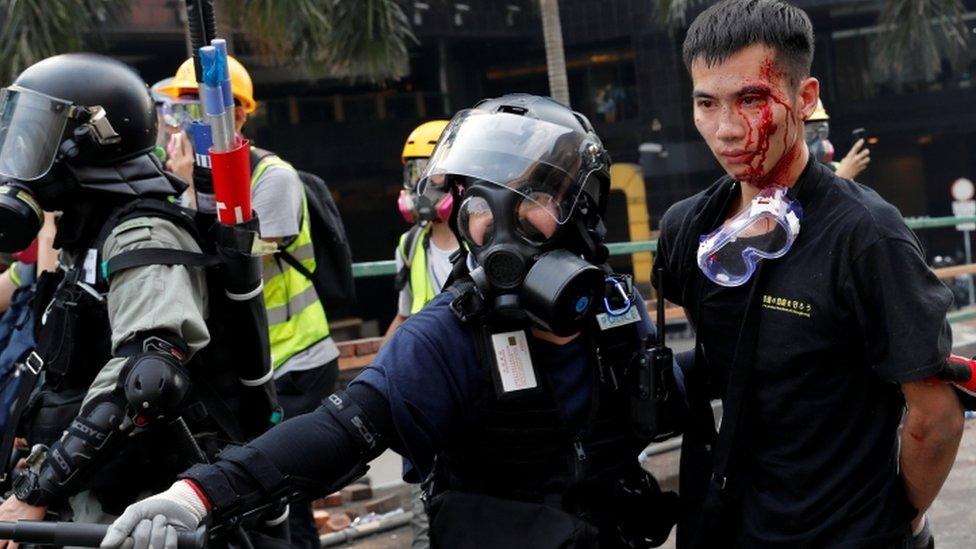
A protester arrested while trying to leave the campus
The university then cancelled all classes for the rest of the term. Days later, protesters at PolyU also tried to block access to a key tunnel near the university.
Protests have also been held at other locations in Hong Kong.
Why are there protests in Hong Kong?
Hong Kong - a British colony until 1997 - is part of China under a model known as "one country, two systems".
Under this model, it has a high degree of autonomy and people have freedoms unseen in mainland China.
The protests started in June after the government planned to pass a bill that would allow suspects to be extradited to mainland China. Many feared this would undermine the city's freedoms and judicial independence.
The bill was eventually withdrawn, but the demonstrations continued, having evolved into a broader protest against alleged police brutality, and the way Hong Kong is administered by Beijing.
- Published18 November 2019
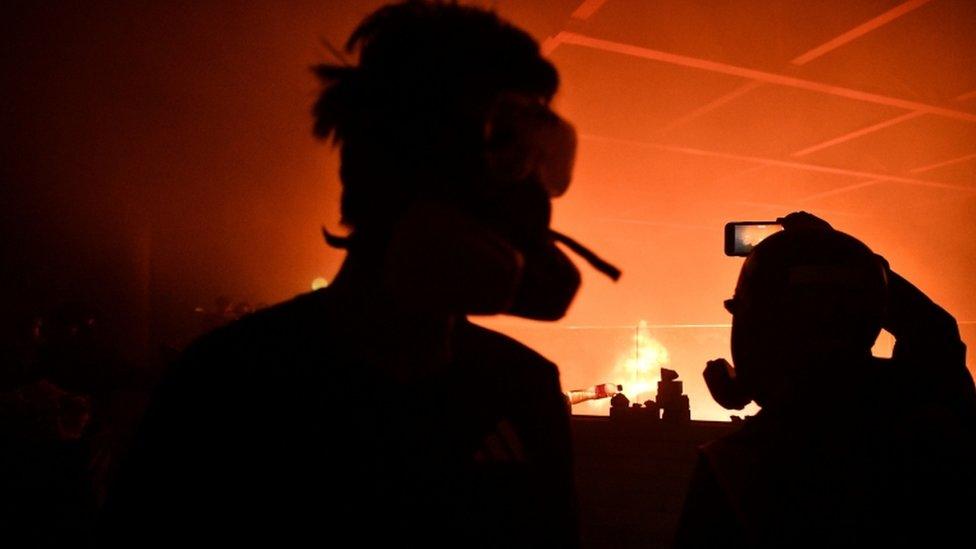
- Published17 November 2019
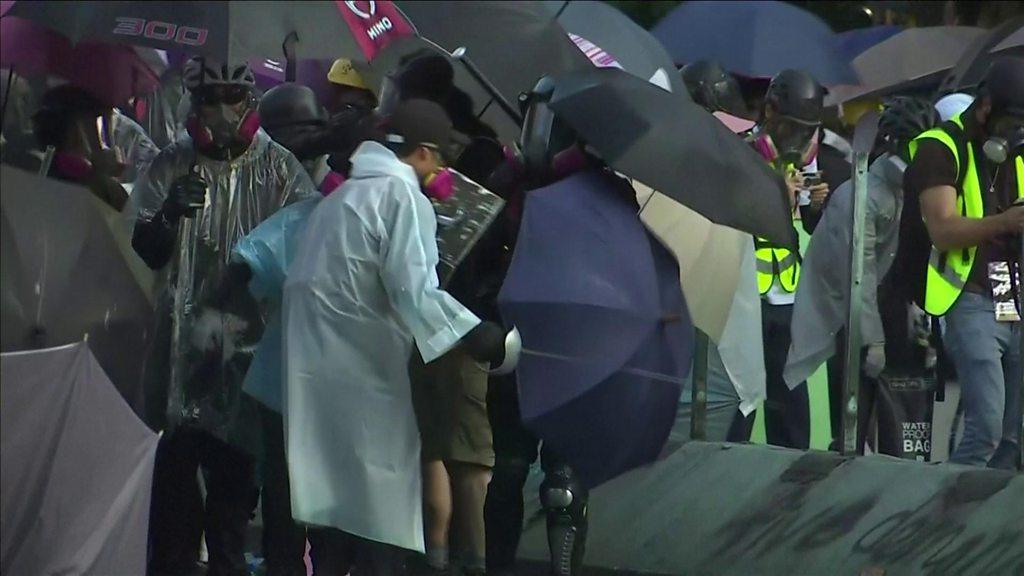
- Published15 November 2019
